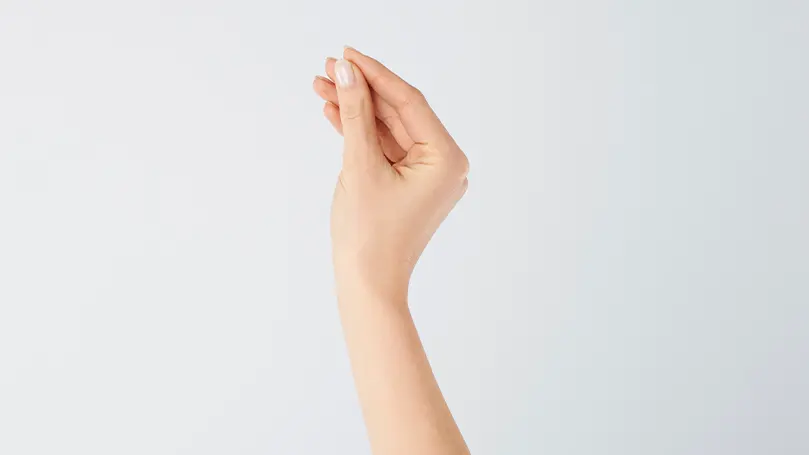Causes of numbness in hands while sleeping
Waking up to a numb hand can be a puzzling and uncomfortable experience. When the hands tingle, the list of reasons for this condition can be long – from nerve damage to circulation problems.
The cause can also be sleeping in an awkward position that compresses nerves, using a pillow that's too high or too low, or having a dream where you're gripping something tight for hours (hey, it could happen!).

Actually, such a condition results from compression of blood vessels or nerves in the hands. Be aware that feelings can be harmless and go away on their own. Let's explore some possible reasons you might be experiencing numbness in your hands while sleeping.
Unhealthy sleeping position
In most cases, the symptoms (burning, numbness) should pass quickly. It may help to slowly move the palm until the sensation returns. A gentle handshake is also helpful. However, if this happens to you more often, the cause (unhealthy sleeping position) should be treated, not the consequence.
Whether you're a side sleeper, back sleeper, or stomach sleeper, you can improve your sleep posture. Certain sleeping positions put pressure on the nerves in the arms and hands. Because of this, stomach sleepers are most at risk. However, sleeping on your side can be an equally bad option if your arm or wrist is bent.
The healthiest choice is to sleep on your back but be careful. If you rest the back of your head on your hand, don't expect improvement!
Unsuitable mattress and/or pillow
How does the wrong mattress affect your body? Insufficient support for the head, neck and spine causes muscle discomfort and tension. Next, pain and stiffness appear in these parts of the body. Eventually, it also affects your nerves and causes numbness and tingling. Stiffness and pain occur due to nerve compression.
So, choosing the right mattress and pillow will maintain good nerve health and prevent nerve-related conditions. You need a surface that provides adequate support, comfort and spinal alignment.
Pinched nerve
What does a pinched nerve mean? Well, it's like pinching your finger. It is very uncomfortable and includes numbness, tingling, weakness and muscle cramps. However, pinched nerves can occur in various parts of the body. For example, it could be your neck, shoulders or legs. The most common causes of pinched nerves include injury, poor posture, or something more serious like a herniated disc.
Well, you never know when you can cause nerve compression. As you have felt a million times by now – they are very sensitive. This is because they transmit signals throughout the body and allow us to feel sensations such as pain, touch, temperature and pressure.
When you think about it, you need them, don't you? That's why paying attention to your body position is important, even when it comes to sleep position. Doing so will prevent potential damage.
Carpal tunnel syndrome
The median nerve runs from the forearm to the hand. When it is compressed in the carpal tunnel, you will feel an annoying sense; triggers can be hand movements, arthritis or diabetes. The same goes for ulnar nerve compression, another nerve that runs in the forearm together with the radial nerve. Radial nerve compression causes almost the same feeling. Have you ever felt aches and pains in your hands after several hours of typing on the computer?
Your body tells you it's time to rest and relieve carpal tunnel pain. However, if, like most, you ignore these signals, you will experience numbness. Don't try to shake your hand or flex your fingers because it wants to stay in the typing position. The good news is that there is a solution. Follow these steps:
- Rest your hand
- Stretch your hands (or consider a voice-to-text program)
If improvement has not occurred, be sure to consult your doctor.
Cardiovascular problems
Various cardiovascular problems, including potentially deadly heart attacks, may cause numbness in hands while sleeping. The same goes for stroke. Numbness after stroke is a common secondary effect because of the affected areas. If you experience any accompanying symptoms, such as chest pain or trouble speaking/walking, go to the ER immediately.
Vitamin deficiency
As we all know, vitamins are crucial for a person's psycho-physical well-being. Deficit causes various problems. For example, vitamins B12 and B6 are important in maintaining healthy nerve function.
What are the consequences of the lack of these vitamins? One of the most common occurrences is nerve damage, which leads to numbness or tingling sensations. Additionally, vitamin E deficiency can cause the same condition. The human body cannot synthesize them, so they must be taken in through food or supplementation.
Tips for alleviating numbness
So you need the blood to rush through your veins and wake up your hands! You can do a handstand, high-five yourself or shake it off like Taylor Swift. However, there are even better methods to get rid of the discomfort.

Change sleep position
This is a powerful method to relieve numbness in the limbs caused by nerve compression. But there are a few things you need to know. Sleeping on your stomach is a big NO. In this way, you put pressure on the wrist and elbows. Sleeping on your back or side is recommended instead.
Putting a pillow between your legs is not a bad idea. In this way, you will reduce the risk of nerve compression in the hands and make it easier to fall asleep. Feel free to experiment with sleeping positions and mattresses.
The sleeping position and mattress must be compatible!
Buy an ergonomic pillow or a new mattress
Have you considered changing your mattress? Changing your mattress or pillow is a significant part of your treatment plan for numbness in your hand. Regardless of whether the cause is harmless pressure on nerves or underlying medical conditions, you need modifications to your sleeping environment.
So, let's go shopping! Still, keep in mind that not all sleeping surfaces are created equal.
Spend some time researching, don’t just buy the first one you find (just like you wouldn't blindly swipe right on a dating app, don't blindly buy a mattress or pillow without doing some research.)
Take sleep supplements
A fibre-rich diet and antioxidants lower cholesterol and stimulate circulation, easing ailments. Poor sleep posture or other sleep-related issues are directly related to numbness in hands while sleeping. That's why sleep supplements are a great solution!
They will significantly improve sleep quality and reduce the risk of numbness in your hands. Some of the most well-known supplements are melatonin, valerian root, chamomile and L-theanine.
However, they are not a substitute for good sleep hygiene. It is equally important to avoid caffeine before bed, as well as the use of electrical devices. Don't forget to maintain a consistent sleep schedule.
Medical treatments
Prolonged tingling and hand numbness can be a sign of a severe medical condition. Problems in the brain or spinal cord can cause it. Diabetic neuropathy (peripheral nerve damage due to diabetes) can cause tingling in the arms, hands and fingers.
In addition, possible causes are peripheral neuropathy, migraine, arthritis, multiple sclerosis, radiculopathy (sciatica), autoimmune diseases or infections. That is why it is vital to determine the cause and only then treat the condition. Approaching the problem sometimes requires the involvement of a whole team of specialist doctors. Chemotherapy-induced Peripheral neuropathy is possible as well along with other symptoms.
Tip: It is necessary to consult a doctor before taking any medication.

Physical therapy
It usually involves a combination of exercises and stretching. It includes various techniques to speed up circulation and eliminate inflammation. Those are:
Strengthening exercises:
- Simple stretches or resistance bands
- Massage: manual massage techniques or with specialized equipment
- Nerve gliding exercises: multiple exercises for “mobilizing the nerve.”
- Heat and cold therapy: hot or cold packs or soaking hands in warm or cold water
Remember: The use of specific techniques in physical therapy depends on the cause of the symptoms.
Braces
Who says numbness can't be fashionable? Braces are one of the most common treatments for carpal tunnel (improve blood flow and relieve pain). So, if you're feeling numbness, tingling, or pain in your hands, don't be afraid to embrace your new accessory. It's a special device that provides support and compression.
There are several types of braces, such as wrist splints, compression gloves, finger splints, elastic wrist wraps or night braces. However, prioritize features such as adjustability, support, and durability when choosing.
Surgery
Unfortunately, sometimes stretching to regain feeling in your hand is not enough. Treating carpal tunnel syndrome can be an example. Surgery is the only solution if other treatments (such as splinting and physical therapy) are ineffective. Is the process painful?
You do not need to be afraid because the operation is performed under local anaesthesia. The procedure involves a tiny incision in the wrist and an incision to relieve pressure on the median nerve. Therefore, the procedure is not demanding, but the recovery period is longer. If you have cervical spondylosis, surgery will be different. Cervical spondylosis is not related to the central nervous system, pa neurosurgeons will have to operate on you.
Medications
Pain relievers such as ibuprofen or acetaminophen are mainly used. They are known to relax muscles, often used for muscle sourness. Anti-inflammatory medications are recommended for swelling like carpal tunnel syndrome or nerve root compression. Certain types of antidepressants can improve nerve function.
Prevention of numbness in hands while sleeping
You wake up in the morning and try to grab your phone, but your hands be like – just five more minutes (or a whole hour), thank you. Don't worry – we have some advice to help you. All you need is to improve your habits. It refers to:
- sleeping positions (If you're a dedicated stomach sleeper, it's time to switch things up)
- wearing wrist braces at night (keep your hands in a neutral position)
- stretch those hands
However, that is not enough. Sometimes the cause of numbness in the hands is stress. That's why you should engage in activities that improve mental health.

Regular physical activity
Numbness in the hands can sometimes be caused by inactivity, but this is not always the case. However, the truth is that inactivity leads to poor circulation, which can cause tingling and numbness. With foot movements, we stimulate blood flow and engage many muscles in the body.
Regular exercise strengthens your body and mind, reduces stress, and improves overall health. You'll also feel fantastic. Well, you know what you have to do.
So grab your water bottle and put on some workout clothes!
Maintaining proper posture
Correct posture does not only contribute to a better physical appearance. By maintaining it, you reduce the risk of numbness in the hands. How? Poor posture creates ideal conditions for compression on the nerves that pass through the neck, shoulders and arms. Thoracic outlet syndrome is so common. For example, slouching and slumping are the most common causes of muscle tension. Fortunately, you can prevent this with a few simple steps:
- Sit and stand up straight
- Keep your feet flat on the ground
- Position your computer screen correctly
- Take breaks
- Use ergonomic equipment
Tip: Give your body time to adjust to new posture habits.
Methods for stress and anxiety relief
Due to a stressful situation, the body releases hormones that affect circulation. Then the blood vessels and blood flow to the hands are narrowed. In this way, tingling and numbness occur. To avoid this, find a way to control your anxiety. The most effective method is abdominal breathing. Why?
A tense situation leads to rapid breathing – hyperventilation. Unlike chest breathing, which is shallow, accelerated and unbalanced, stomach breathing allows for the best utilization of oxygen and carbon dioxide. Breathe in slowly through your nose and feel your lungs fill with air and your stomach slowly rise. Count to 4 while inhaling. Then, exhale through your mouth for a count of 7.
When to seek medical help if numbness in hands while sleeping occurs?
If the numbness in your hands lasts longer than you previously felt, usually a short period, experts advise that emergency medical help should be sought. Although hand numbness may be the first or only symptom you notice and feel, it is still a condition that needs to be treated.
Determining the cause of tingling hands begins with an examination and determining the history of the disease so that the doctor can get as much information as possible.

Persistent numbness or tingling
Well, you'll be much better off if you stop sleeping on your arm all night. At what point should I consider my numbness as “persistent”?
The answer is complex. It depends on the specifics of the numbness. But if you feel a burning sensation in your hand for more than five days and there is no improvement, you should take action. You can be one hundred per cent sure only if you perform the prescribed examinations by a medical professional.
Better to err on the side of caution when it comes to your health. A consultation with a doctor is always a good idea!
Weakness in hands and arms
Also, pay attention to the intensity of the feeling. If you feel muscle weakness, it is difficult for you to hold objects, so seek medical help as soon as possible (no matter how many days have passed).
Numbness and weakness are often related symptoms, as with carpal tunnel syndrome. Such a condition indicates damage to the muscles or nerves that control arm movement and strength.
Yet, wakefulness in the hands and arms can also be a symptom of other conditions that affect the nerves or muscles in the arms and hands.
Pain or swelling
If you are experiencing pain or swelling in addition to numbness in your hand, it is crucial to seek medical attention. Why? In some cases, it is just compressing or irritating the nerve. However, with a physical examination, you can be sure if it is something more serious. These include carpal tunnel syndrome, arthritis, tendonitis, or a sprain or strain.
Difficulty performing daily activities
See a doctor if you struggle to hold an object in your hands and perform fine motor tasks.
The doctor will perform imaging tests and physical examinations to determine the appropriate treatment plan. In some cases, this involves surgery, but mostly it is medications, physical therapy or simple advice. Such feedback will help you relieve symptoms more painlessly and improve your ability to perform daily activities.
Conclusion
Numbness in the hands can be a real challenge when performing everyday tasks. Suddenly, simple tasks like buttoning pants or typing on the phone become a Herculean effort. Physical therapy, body massage, drugs, and, if necessary, surgical intervention are mainly applied.
Don't worry; you can improve your habits to reduce your risk of experiencing this annoying sensation. Therefore, improve your sleep posture, exercise regularly, and maintain a healthy diet.















There are no comments yet
"*" indicates required fields